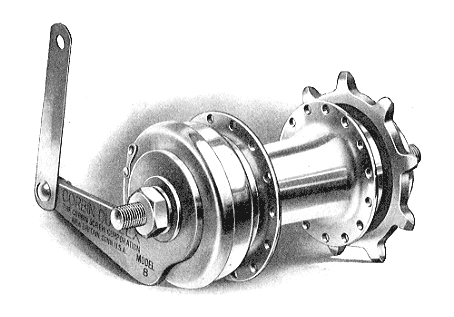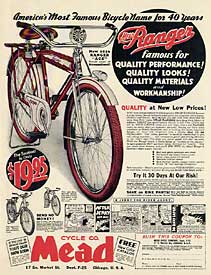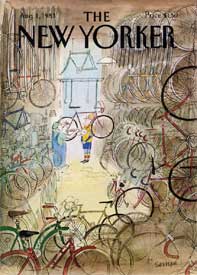| Take
a break here! Below are links to some great examples from my bicycle collectables, nameplates and ads, which I’ve accumulated over a twenty-year period. 
|
| |
| Nameplates |
| Nameplates
(also called “head badges”) are what manufacturers used
to attach to the fronts of their bicycles as a classy signature, not
unlike Mercedes’ hood ornaments. These plates gave the makers
a nifty way to differentiate their models from others. This was important
because the bikes often looked remarkably similar. But, if your model
featured an amazing nameplate, you could win the sale. Imagine how
a 10-year-old might be drawn to a bike with a Robin
Hood emblem. And, fittingly, the nameplate often survived long
after the bike was tossed because it was the main emotional attachment
and easy to store. I collect nameplates because each (I have about
700) makes me imagine who might have ridden that bike. |
||||

Case 1 |

Case 2 |

Case 3 |

Case 4 |

Case 5 |
| |
| Though
they weren’t meant for this, bicycle
ads provide a convenient bicycle
history by recording the ways two-wheelers changed over the years
and showing the different cycling trends and fashions as the sport developed.
In its heyday (the 1890s), cycling was revolutionary in many ways and
the quality of the artwork and fascinating
nature of the themes in the vintage advertising is unique and wonderful.
And, unlike the bike industry's current in-your-face ads depicting stunts
and attitude, early ads portrayed the machines and activity in a positive
light capturing the joy, fun and healthy benefits of riding. I find
them refreshing and nostalgic.
On my covers page you’ll find a selection of The New Yorker Covers by artists who obviously respect and love bicycles. It has always impressed me that a major magazine such as The New Yorker would grace their covers with so many beautiful paintings of bicycles. Click on the images below to go to my pages of bicycle ads and covers: |
|
 Ads |
 Covers |